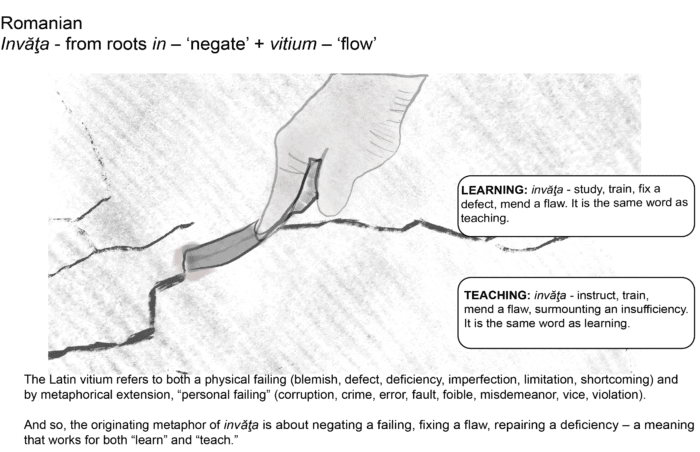Root Metaphor
Invăţa - To negate a defectComposite Visual Metaphor

Etymology
Invăţa is derived from the Latin in- “not, negating” + vitium “flaw,” and so its literal meaning has to do with about negating a defect, mending a flaw, surmounting a deficiency. The Latin vitium refers both to a “physical flaw” (blemish, defect, deficiency, imperfection, limitation, shortcoming) and, by metaphorical extension, “personal flaw” (corruption, crime, error, failing, fault, foible, inability, misdemeanor, vice). Invăţa means both“learn” and “teach” – which makes sense, since the notion of “fixing defects” can be applied just as easily to one’s own deficiencies as to someone else’s.Common phrases
Common phrases about learning- “to gain experience” or “to teach someone a lesson” = a învăța minte (minte = mind)
- to advise, to counsel someone how to do something = a sfătui, a povățui pe cineva să facă ceva
- “to teach someone a lesson” or “to gain experience” = a învăța minte (minte = mind)
Commentary
The common sense of “learn” in Romanian has to do with “becoming familiar with,” which is similar to that of many Slavic languages – which, geographically speaking, makes sense. However, Romanian is actually a Romance language, and its closest relative is Italian. Unsurprisingly, then, and as noted above, the original meaning of the most commonly used word for “learn” in Romanian is rooted in Latin.Please cite this article as:
Francis, K., Davis, B., & Mitrache, D. (2021). “Invăţa" (Romanian) în Metaphors of Learning in Different Languages. https://doi.org/10.11575/8B7N-V637. https://learningmetaphors.com
⇦ Back to Map
⇦ Back to List
